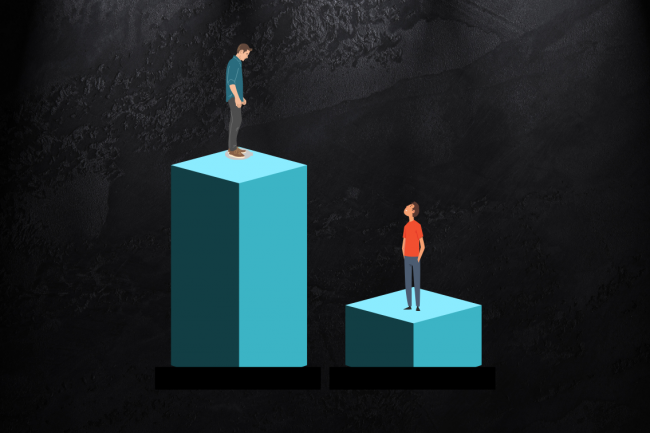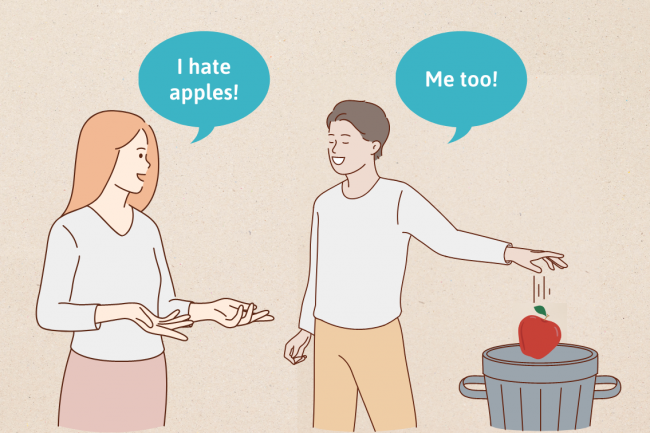Any relationship, whether romantic or platonic, cannot thrive without there being relatively equal give and take.[1] Relationships provide people with a sense of belonging, but when affection is one-sided, the person who cares is left feeling rejected.[1][2] Some people have developed a habit of responding to rejection by trying even harder to win the other person’s love. In the long run, this just leads to more hurt.
If you have a tendency to chase after people, even when they don’t seem interested in you, then this article is for you. This article will describe what chasing others looks like and will explain how to stop doing it. It will also consider why people tend to chase after others and how stopping this behavior is beneficial.
Sections
- What chasing people looks like
- How to stop chasing people
- Why it’s beneficial to stop chasing people
- Why do some people chase others
What chasing people looks like
If you chase after others, it means that, when it comes to relationships, you are the one who puts in most of the effort most of the time. You may wonder whether the relationship would survive at all if you stopped engaging with the other person.
Here are two key features of chasing behavior in relationships:
1. There’s no reciprocation
The term “chasing” implies a one-way dynamic between someone who pursues and someone who moves away. The person moving away rarely, if ever, turns back and moves towards the pursuer. This is how it is in relationships where one person chases after another: no matter how hard they try, they cannot “catch” the other person and win over their affection.
Here are some examples of what a one-sided relationship looks like:
- One person always calls or texts first, and they rarely get a reply.
- One person always goes out of their way to spend time with the other. For example, rearranging their schedule or traveling to the other side of town.
- One person is always offering to help the other but favors are not appreciated nor returned.
2. The authenticity is missing
People who tend to chase after others will usually go to great lengths to be liked and accepted by those they chase. They can easily become “social chameleons,” meaning they will change who they are to fit in and please the people around them.[3] This could look like giving in to peer pressure. For example, at the extreme end, this could look like someone taking recreational drugs just because a new friend is doing it.
How to stop chasing others
The key to stopping running after others is to start valuing yourself more. A person who knows their true worth will not put up with lukewarm relationships. They will not tolerate being taken advantage of by others. Instead, they will choose relationships with people who respect and appreciate them.
Here are 6 ways to put an end to chasing others for good:
1. Build up your self-esteem
People who chase others usually become disappointed when their efforts are not reciprocated. That’s because they often have low self-esteem, which leads them to seek the approval of others.[4] Relying on external validation is not sustainable, especially since what someone thinks is beyond anyone but that person’s control. Self-acceptance has to start at the individual level.
To enhance your self-esteem, consider your self-talk: try talking kindly to yourself instead of being self-critical. We have an article on how to stop negative self-talk that you might find useful. If you’re unable to change your internal dialogue on your own, consider working with a therapist. A therapist can work with you to break negative beliefs that interfere with the development of healthy relationships.
2. Do what pleases you
When it comes to the people you chase, ask yourself whether you’re chasing them because you truly feel you have a connection or whether it’s to gain their acceptance. People will often chase others even when they don’t click simply because their desire to win another person’s love is so strong.[5]
Instead of trying to make any relationship work—especially ones where the other person is disinterested—bring the focus back to yourself. Rather than chase relationships, chase interests and hobbies. If you spend your time partaking in the things you enjoy, you’ll be much more likely to meet people you really connect with. When people share common ground, relationships tend to develop organically,[6] and there is no need to pretend to be someone you’re not.
3. Nurture existing relationships
Chasing after others can drain your energy and take time away from other important relationships in your life. If you have any relationships that have stood the test of time, these should be cherished, and they need attention, too. Rather than investing in relationships with people who are disinterested in you, think about re-investing in existing relationships with people who care about you.
4. Provide space
One surefire way to know whether you are wasting your energy on a friendship, or a budding romance, is to give the person you’re chasing some space. Stop all contact with them and see whether they become interested in you or not. It’s a win-win: either they will start to miss you, realize your value, and reach out, or you’ll be ghosted by them forever. Being ghosted counts as a win because it shows the other person’s true colors and completely eliminates the effort you would have spent on trying to make the relationship work.
5. Remove the pedestal
Part of the reason people chase others is that they see them as superior in some way. So winning the other person’s affection is kind of like the ultimate prize. Idealizing others does not do anyone any favors, though.
Research has found that people don’t like being over-idealized—in fact, they tend to distance themselves from people who over-idealize them.[7] Another issue with the idealization of others is that it can blind you to their faults. So any time the idealized person behaves poorly, that poor behavior is overlooked. Instead of idealizing someone you don’t truly know, take a step back and consider that they are human, too. They have just as many flaws as the next person, and just as you are not below them, they are not above you.

6. Expand your efforts
When it comes to new relationships—whether romantic or platonic—if you really like the other person, it can be hard to contain your enthusiasm. However, there is a risk that comes with putting all of your eggs in one basket. The risk is that the relationship may not work out, in which case you could be left feeling quite bitter and lonely.
Instead of focusing all of your energy on one new relationship, take things a step at a time and let the relationship develop naturally. Focus on getting to know multiple people on a surface level and see who you really click with. Then, invest your energy in those who seem to value you just as much as you do them!
Why it’s beneficial to stop chasing people
Making the decision to stop chasing people will have positive, knock-on effects in all areas of your life. You will instantly free up time and energy to spend on things and people that enrich your life. In time, you’ll become a happier, more confident version of yourself!
Here are 4 benefits you can expect when you stop chasing people:
1. Enhanced self-image
In a one-sided relationship, the person doing the chasing tolerates the bare minimum from the person being chased. In putting up with a lack of effort, the person doing the chasing is doing him or herself a disservice. By allowing the relationship to continue as is, they are setting the standard by which they allow others to treat them.[8] Ending the chase is one way of taking a stand for yourself and asserting your value. Putting yourself first in this way is an act of self-love that will boost your self-image.
2. Better use of energy
Chasing people is exhausting because you give so much and get nothing in return. When you stop chasing people, you’ll realize how much extra energy you have to invest in other things. These other things could include other relationships that do serve you, new hobbies, new projects—anything that adds to your life in a positive way.
3. Avoidance of toxic relationships
Relationships that are imbalanced can quickly become toxic if the person who doesn’t care starts to take advantage of the person who does. If you’re chasing someone, they may use your obliging nature against you. For example, they may end up using you only when they need something, like a last-minute backup date.
It may seem cruel, but people you chase will do this because you have inadvertently sent the message (by chasing them) that your time is not valuable. Choosing not to chase people avoids a power imbalance that can emerge when one person is much more invested in a relationship than the other.[9]
4. No pressure to be someone you’re not
When low self-esteem and the need for external validation drive the urge to chase others, people sometimes put on an act to win others’ approval. They may do things like agree with others’ views, laugh at others’ jokes, and pretend they have the same preferences as others—all in an effort to be liked. Putting an end to chasing others is the same as saying that you’re not going to change your authentic self to fit in with others.

Why do some people chase others?
There are multiple explanations as to why some people develop a habit of chasing others. Most of the time, this behavior can be linked to childhood experiences. It’s also tied to the way people typically respond to mixed signals.
Here are 3 reasons why people chase others:
1. They have a need for validation
People who chase after others often have low self-esteem and a high need for approval from others.[4] This could have stemmed from childhood experiences, such as bullying[10], or through their relationship with their parents. It may be that they had to work hard for their parents’ love or that their parents’ love was dependent on them meeting certain conditions.[11] Wherever it comes from, people who chase others look outside of themselves for validation, and that is why they chase others.
2. They have an insecure attachment style
People develop models for relating to others through their relationships with their primary caregivers—in most cases, their parents.[12] So, unhealthy patterns that show up in adulthood, like chasing after others, have their roots in childhood.[12]
If, as a child, your parents met your needs inconsistently, you can develop an “insecure attachment style.”[13] Insecure attachment can be broken down further into “anxious attachment” and “avoidant attachment.”[13] Running after people is an example of anxious attachment—people with this attachment style over-rely on relationships for reassurance.[13]
3. Their behavior has been reinforced
In behavioral psychology, reinforcement explains whether a certain behavior will continue or not depending on whether certain consequences are enacted.[14] Consequences can be rewarding, or they can be unpleasant.[14]
If a person expects a reward, but they are unsure of when or whether they will be rewarded, when they are finally rewarded, they respond more strongly.[15] This explains why some people can’t help but chase after someone they like, even when the person seems disinterested.








